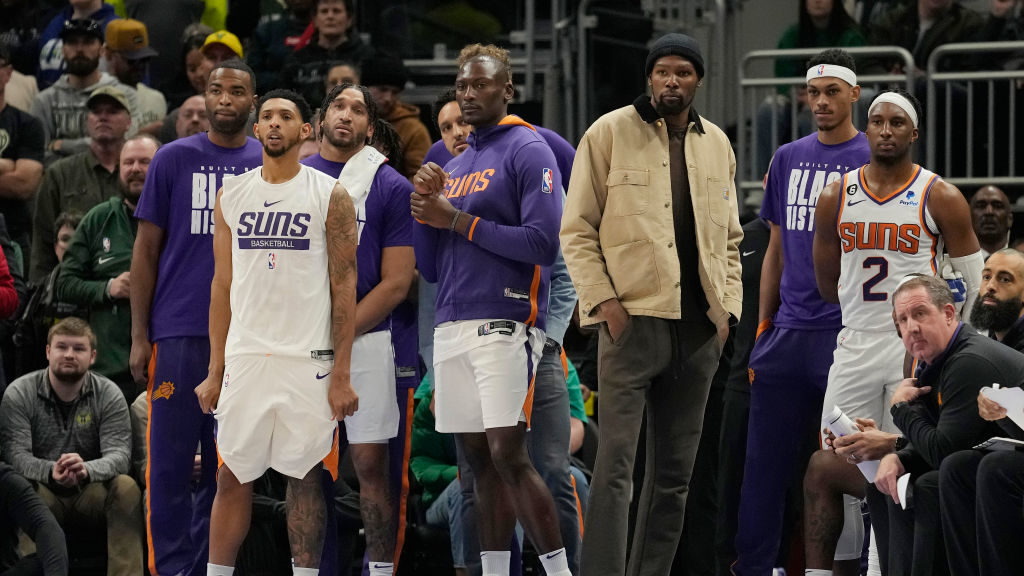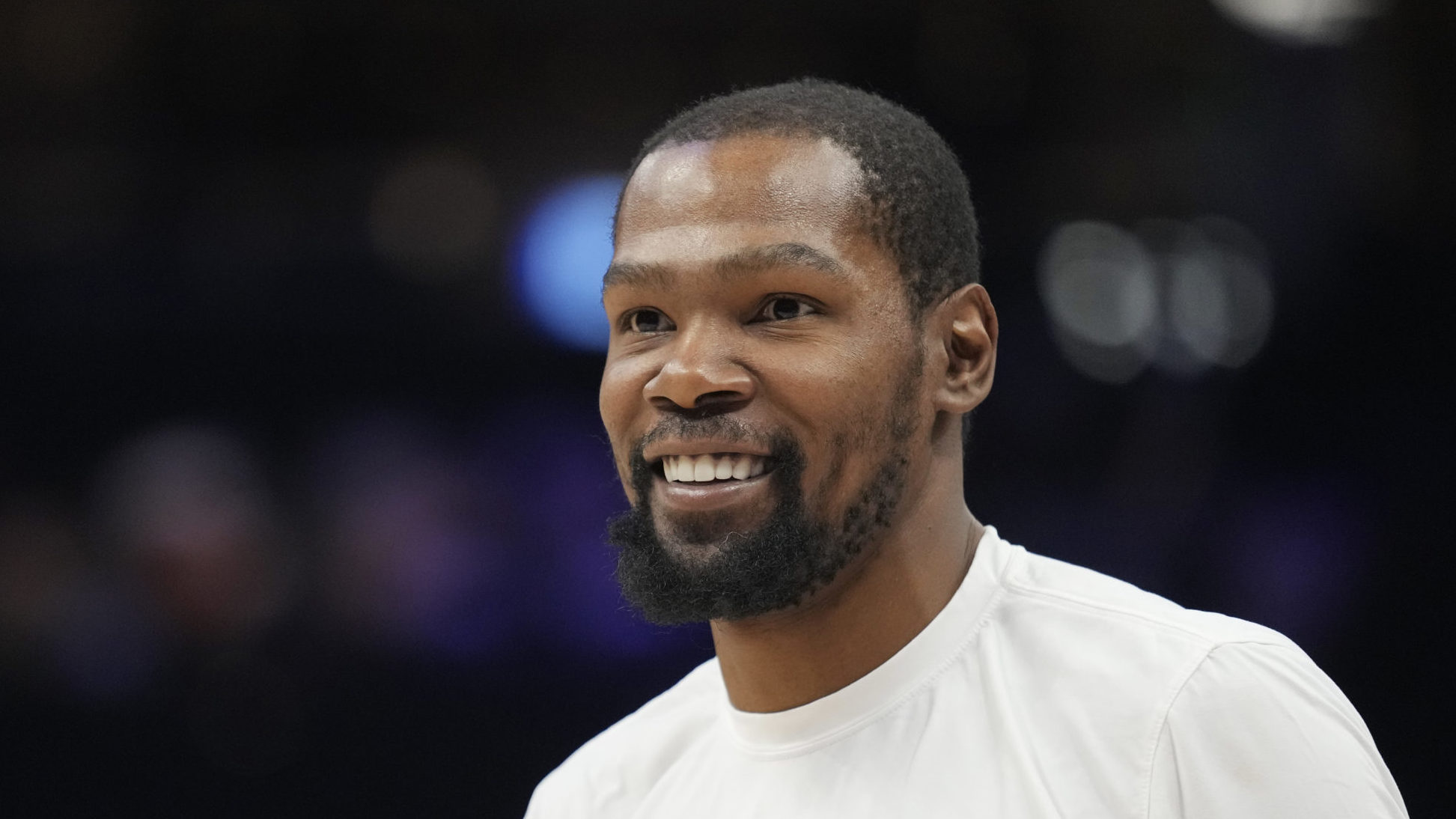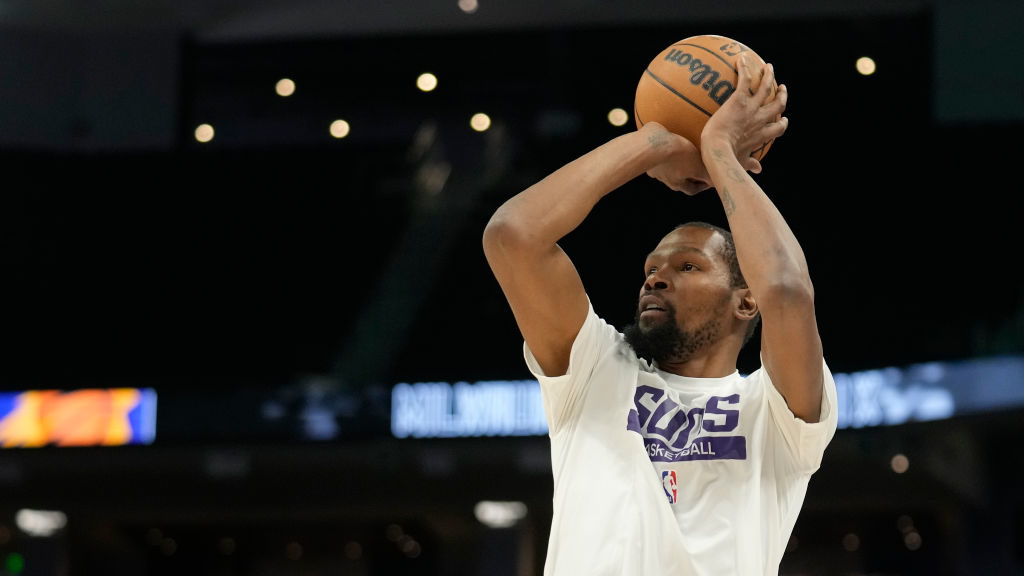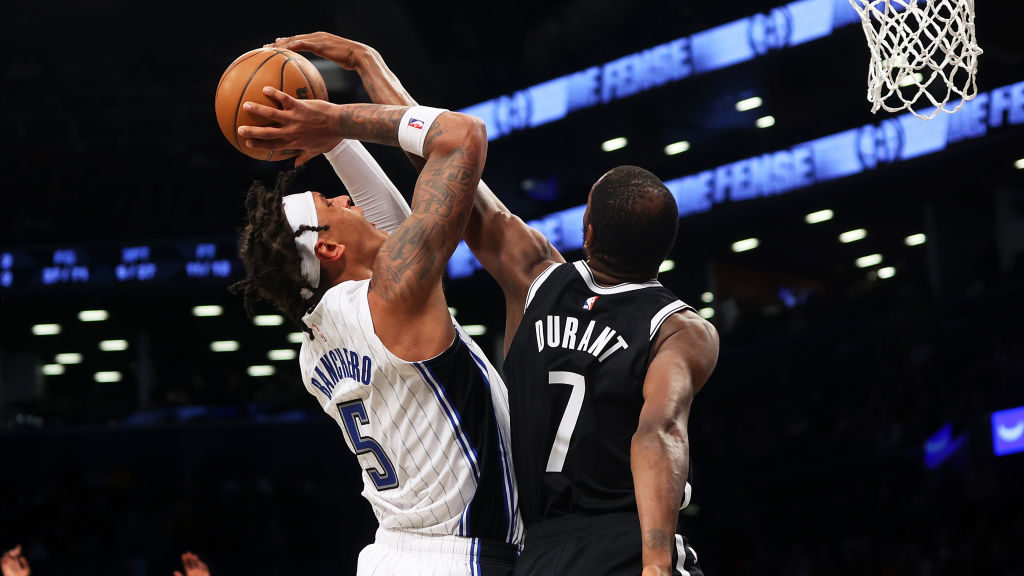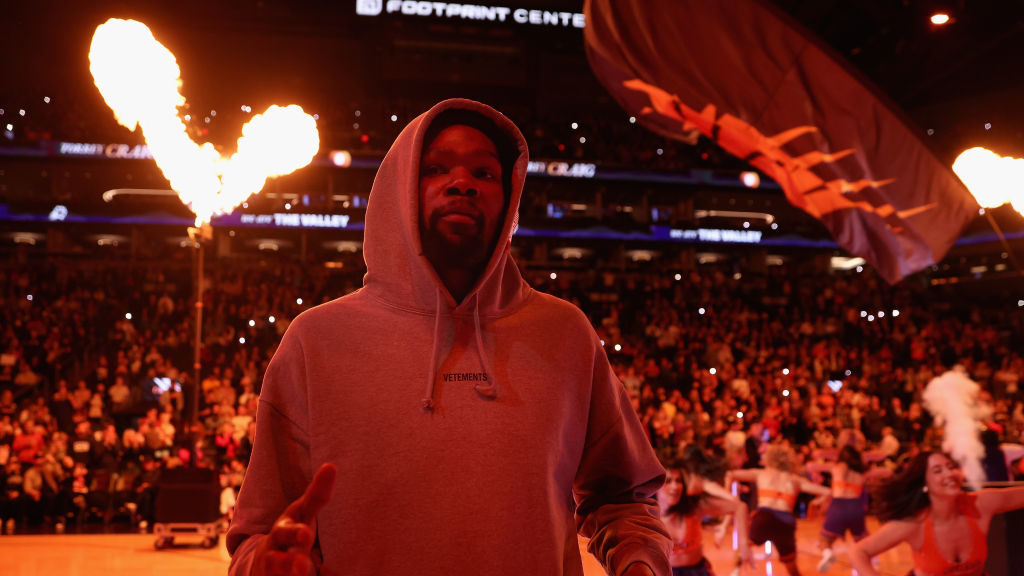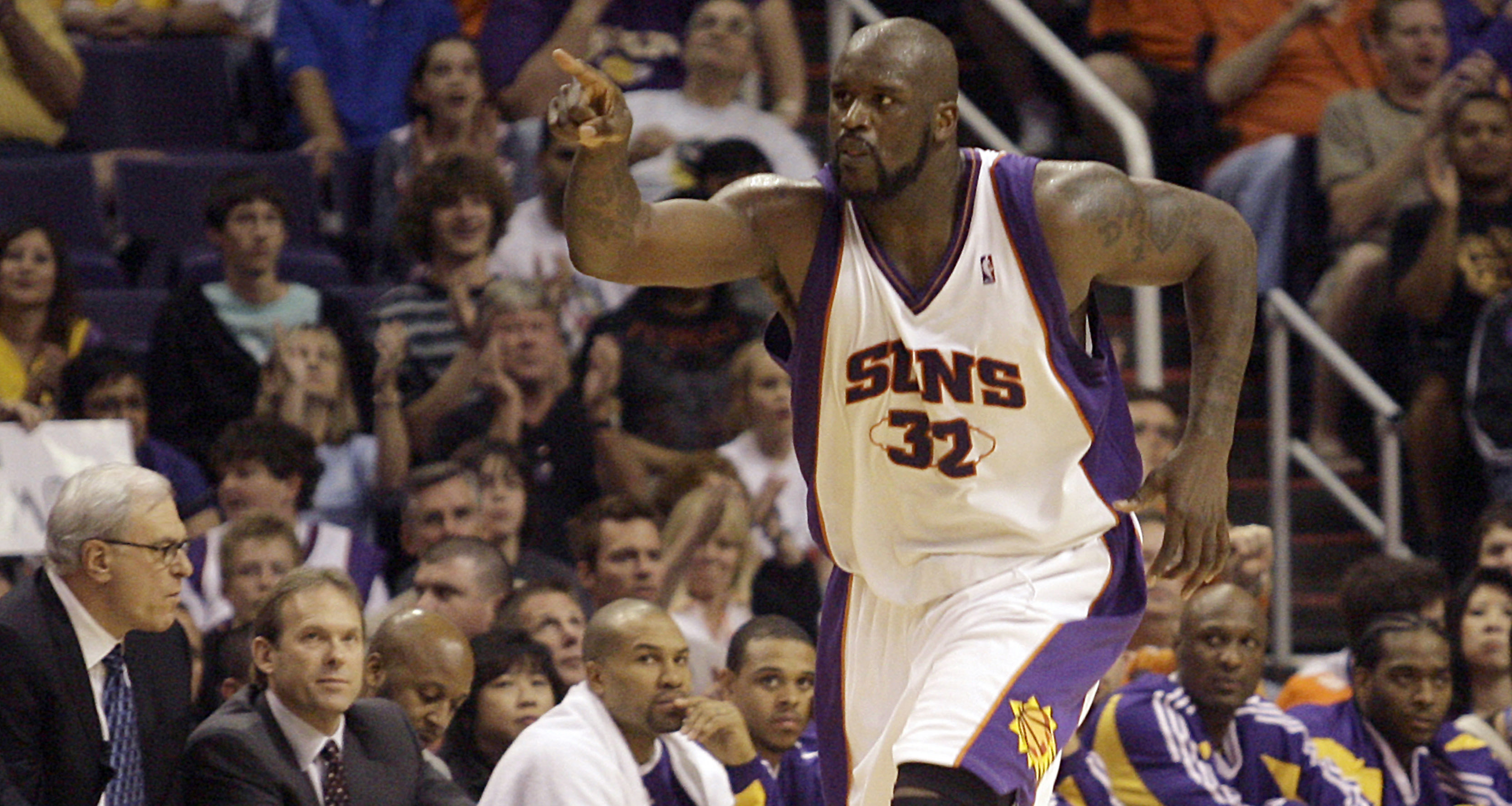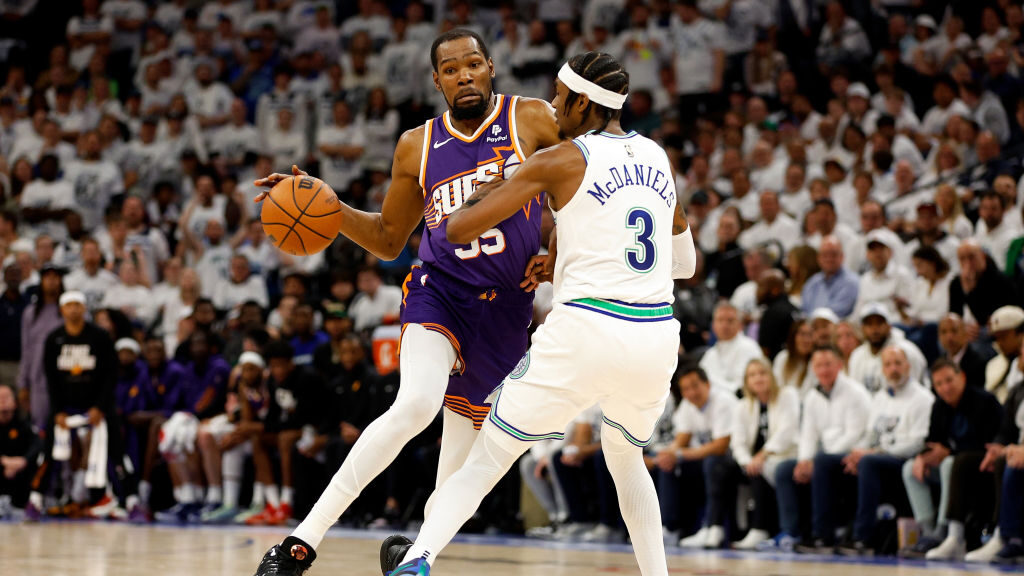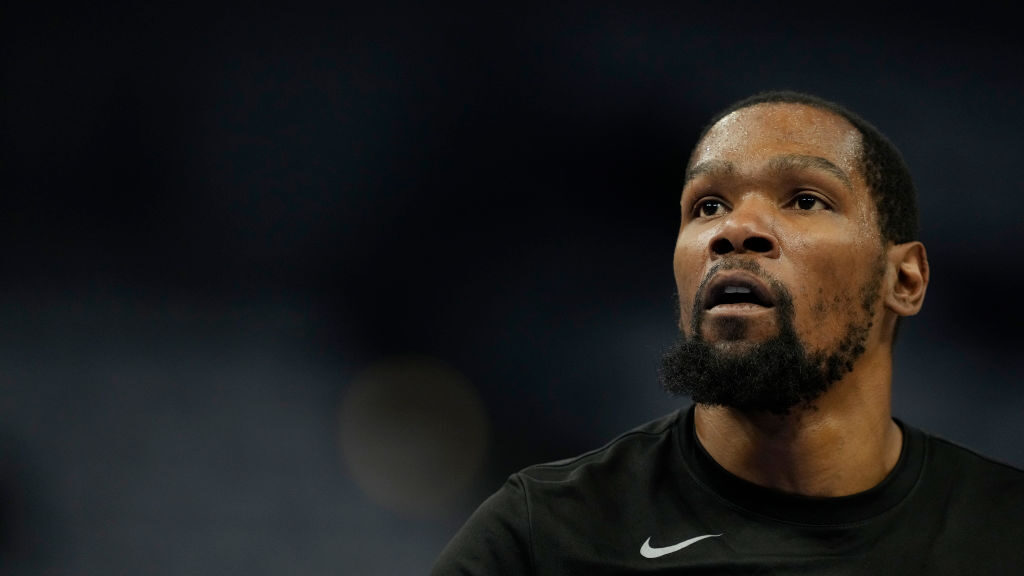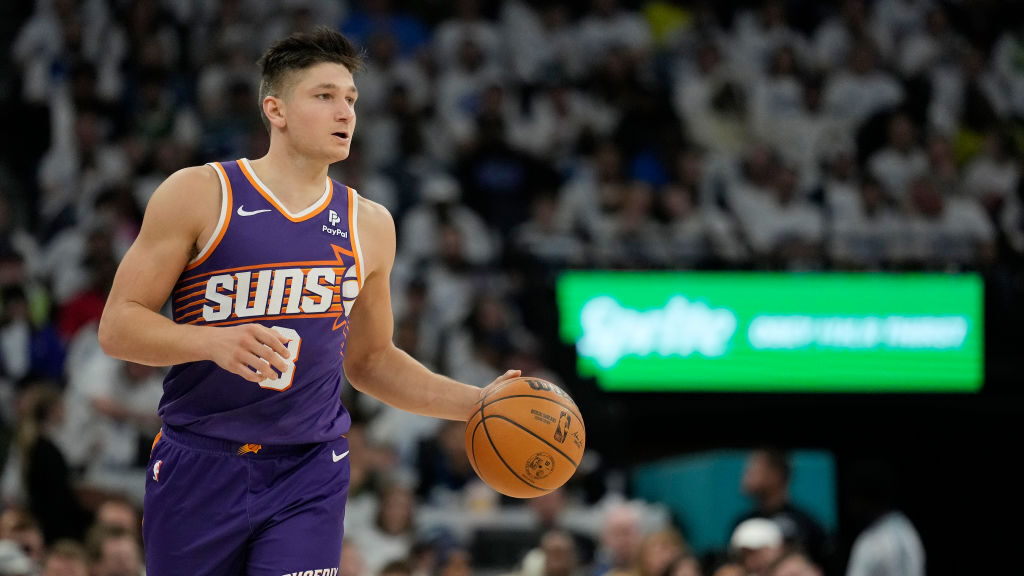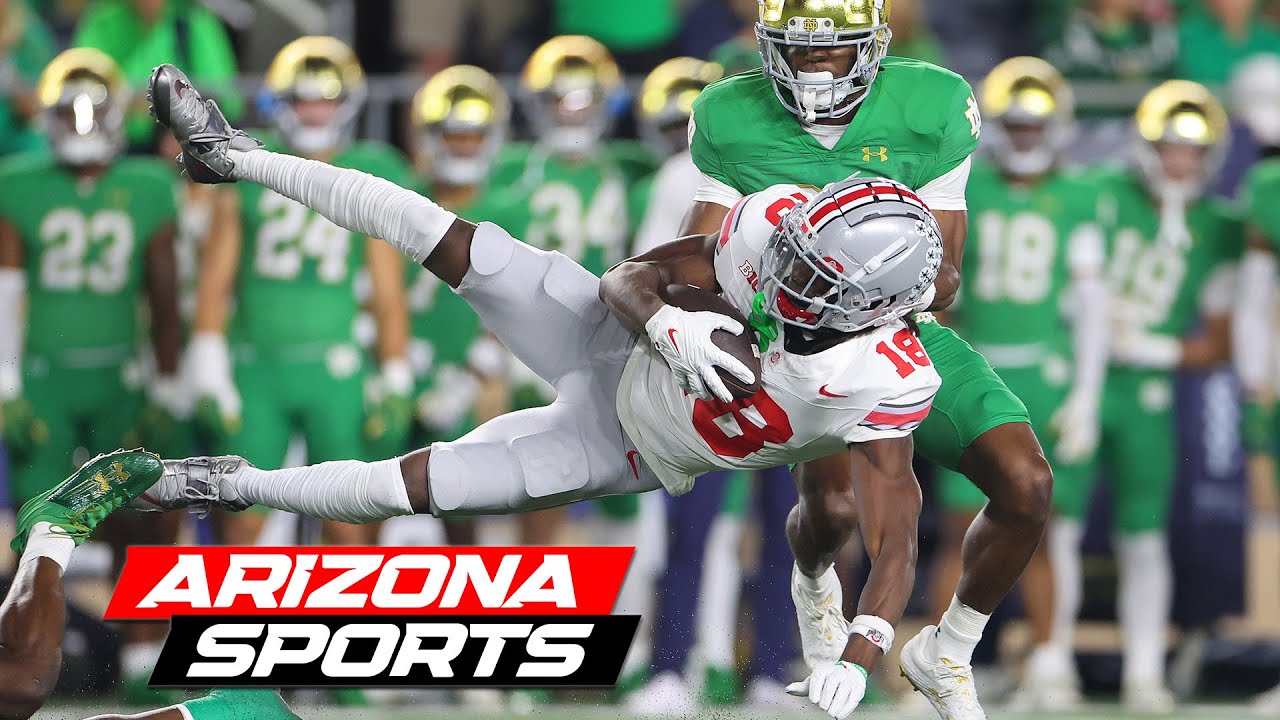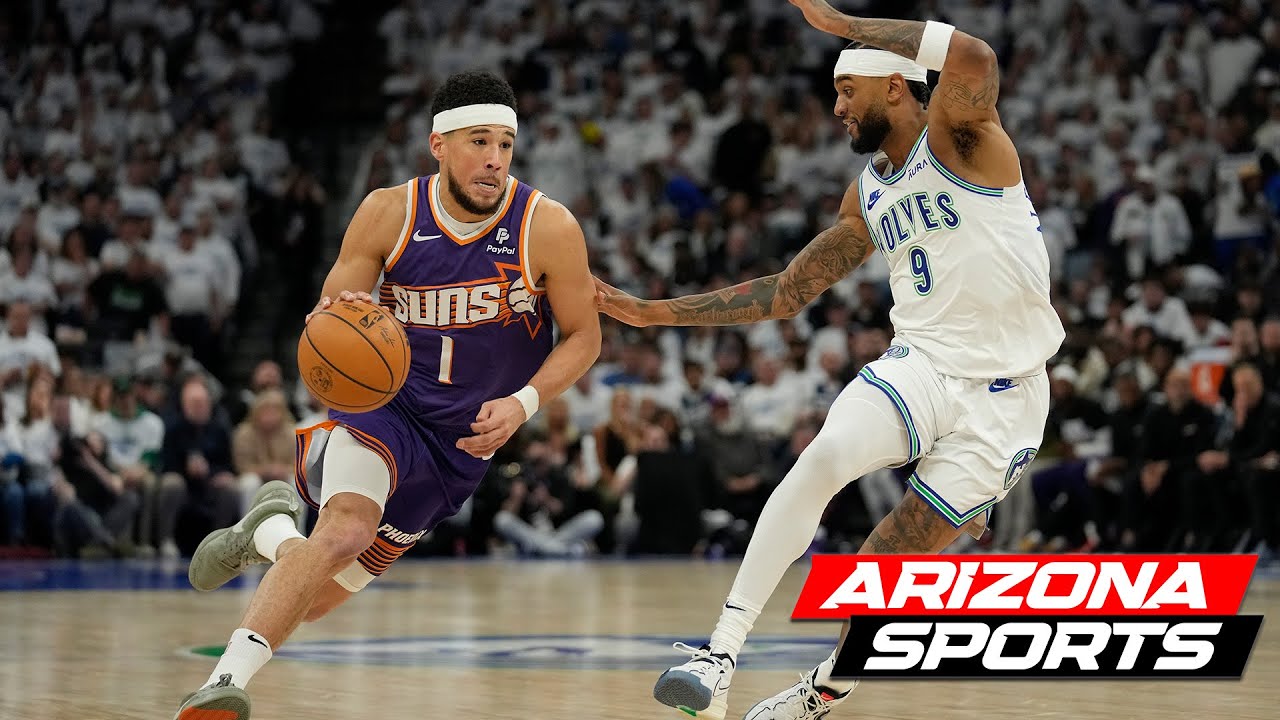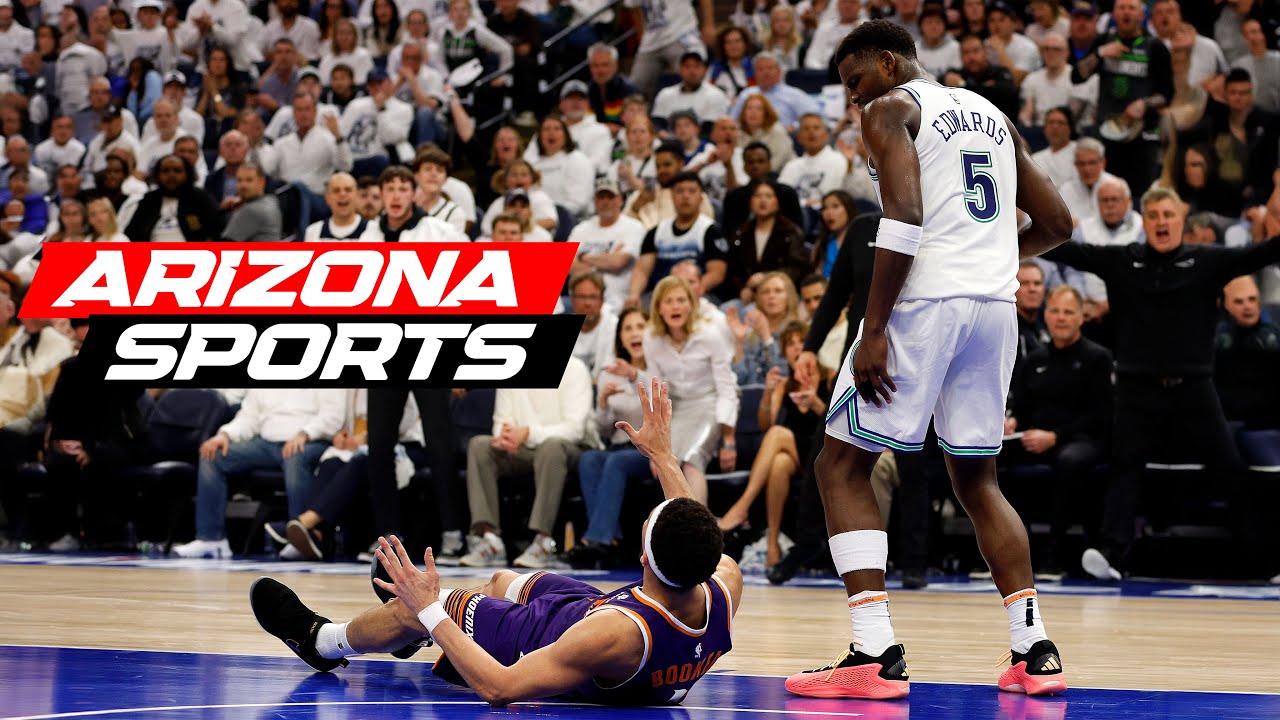In anticipation of KD: A look back at the Suns’ big midseason debuts
Mar 1, 2023, 8:10 AM
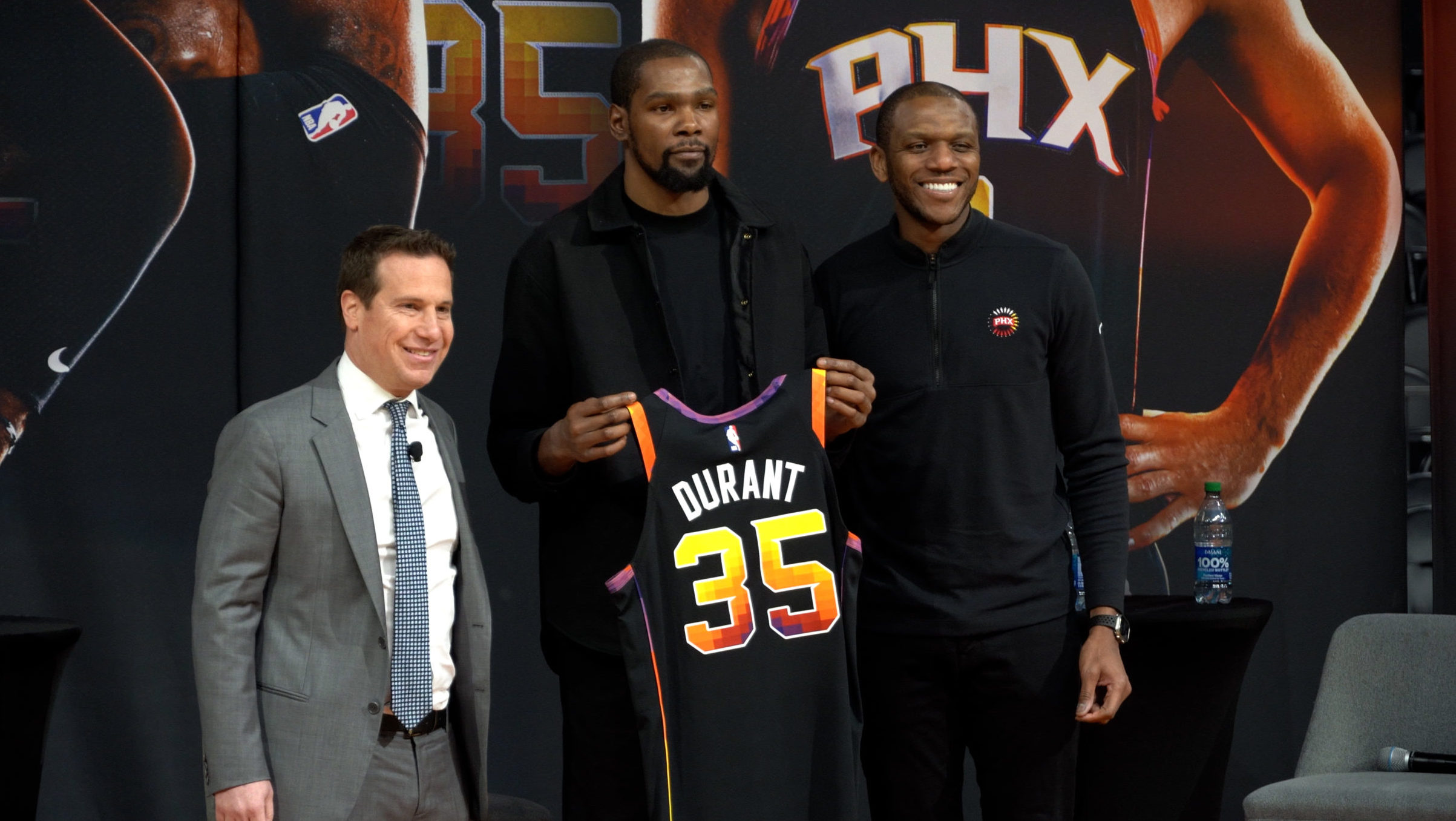
Kevin Durant is introduced at a press conference in front of fans at Footprint Center in Phoenix on , Thursday, Feb. 16, 2023. (Jeremy Schnell/Arizona Sports)
(Jeremy Schnell/Arizona Sports)
Some are calling it the biggest midseason trade in the history of the NBA.
On Feb. 9, the same day Mat Ishbia was introduced as the new primary owner of the Suns, Phoenix rocked the basketball world by trading for Kevin Durant from the Brooklyn Nets in a deal that cost them Mikal Bridges, Cam Johnson, four first-round picks and a pick swap.
It’s rare that a former MVP, two-time Finals MVP, 13-time All-Star and four-time scoring champ gets traded. Wednesday night, we’ll finally see Durant’s debut for the Suns, 20 days after the deal went down, in Charlotte against the Hornets.
If you want to debate whether this is the biggest in-season trade ever, fine. It’s up for debate. What’s not is that it is easily the biggest midseason swap in the 55-year history of the Suns. But it’s not the only biggie. In anticipation of KD’s debut, here’s a look at how some other Phoenix first games went after trade deadline deals.
Charlie Scott
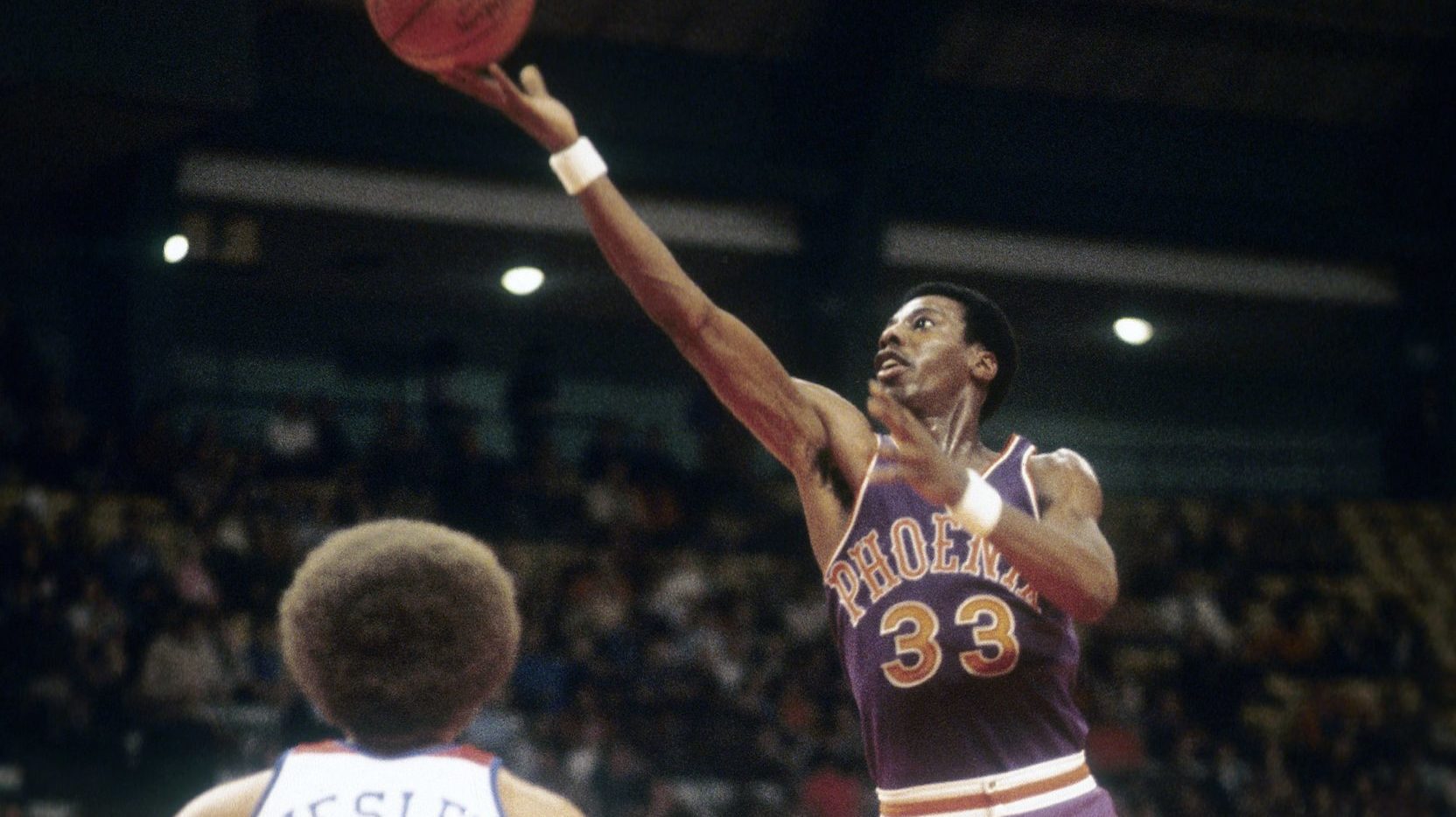 (Photo by Focus on Sport/Getty Images)
(Photo by Focus on Sport/Getty Images)
Debut date: March 15, 1972
Trade details: Scott was drafted by the ABA’s Washington Capitols in January 1970 and signed with them a week before the Boston Celtics drafted him in the seventh round in March. Yes, the draft was in March back then. Weird, huh?
Scott never wore a Capitols uniform — the team moved to Norfolk and became the Virginia Squires. Scott, the former North Carolina Tar Heel, got comfortable really quickly in the offense-happy ABA, averaging 27.1 points per game as a rookie. The next year, he led the league by scoring 34.6 points per contest (and Julius Erving was his teammate).
Scott tired of the ABA life and wanted to jump to the NBA, where the Suns completed a trade for his draft rights by sending bruising forward Paul Silas and cash to Boston on March 14, 1972, although Silas wouldn’t head to Boston until after the season. Again, weird, right?
The debut: A day after the trade went down (and there was a lengthy and messy legal process that dragged on), Scott made his debut, playing 22 minutes off the bench in a 110-106 win over the Milwaukee Bucks. Scott struggled with his shooting, hitting on just 4-of-15 from the floor, but finished with 11 points, four rebounds and four assists.
Scott’s play, along with a monster team rebounding effort, helped the Suns overcome a big night from Kareem Abdul-Jabbar, who scored 36. The Bucks didn’t have Oscar Robertson, who missed the trip with an abdominal injury.
“He certainly sparked us,” head coach Cotton Fitzsimmons told the press after the game. “For an opening night, Charlie was awfully tough. He can fit into any style of play.”
The aftermath: Scott would play in only six games in the 1971-72 season with the Suns, who finished 49-33 under Fitzsimmons but didn’t qualify for the playoffs. Scott became an All-Star in all three of his full seasons with the Suns, but they never made the playoffs in his time in the Valley. He’d be traded in May 1975 to the Celtics for Paul Westphal, who became a Phoenix legend and helped the Suns make the NBA Finals in the 1975-76 season, where they’d lose in six games to the Celtics with Scott and Silas.
Truck Robinson
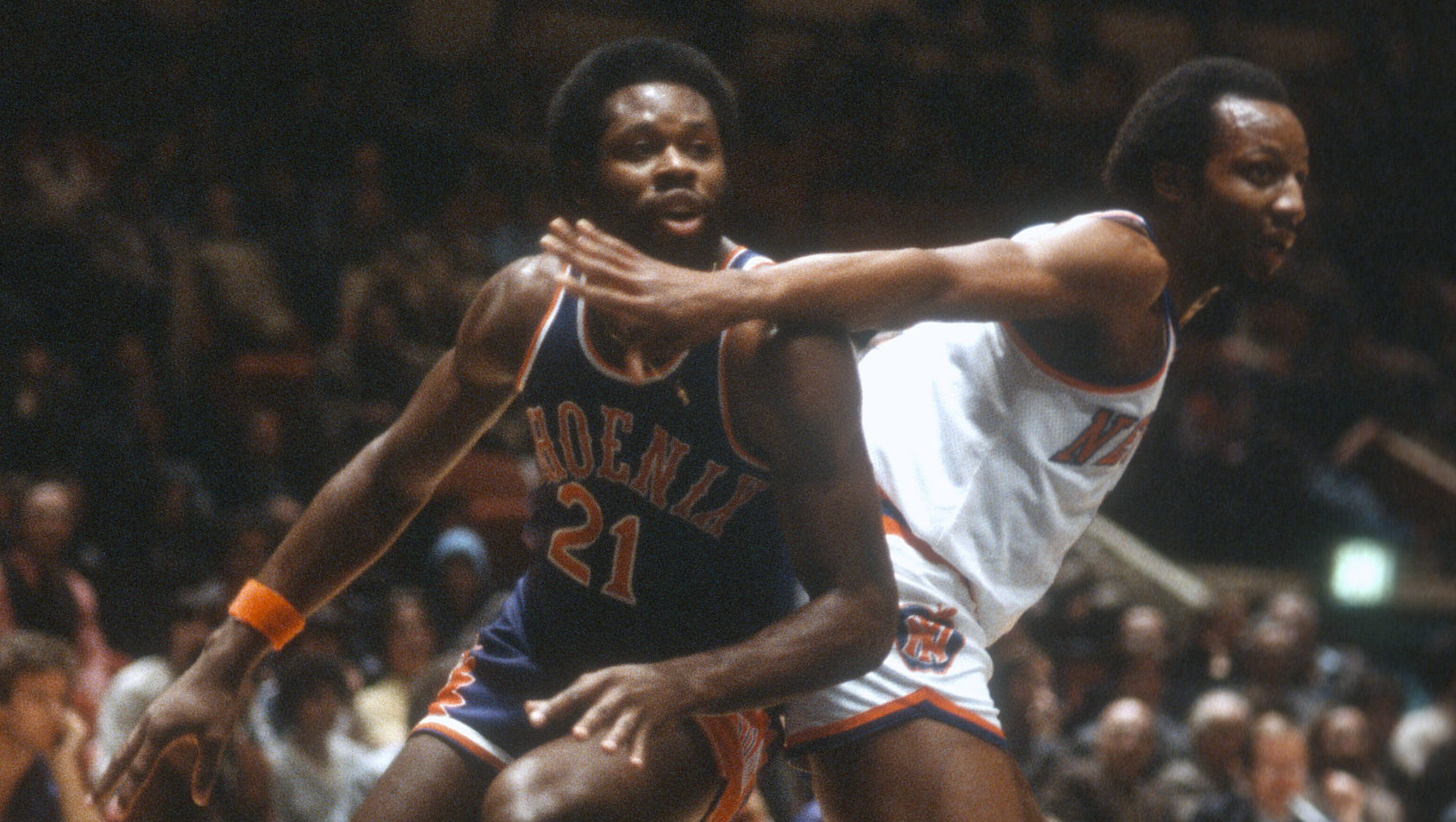 (Photo by Focus on Sport/Getty Images)
(Photo by Focus on Sport/Getty Images)
Debut date: Jan. 13, 1979
Trade details: The Suns were 26-17 in mid-January and a team loaded with talent, enough to have hopes of winning the first NBA title in the franchise’s 11-year history. Robinson, who led the league in rebounding in 1978 by averaging a ridiculous 15.7 per game (still the seventh-highest per-game average since the ABA merger) wanted to renegotiate his contract with the New Orleans Jazz. He was playing in the shadow of Pete Maravich and the Jazz balked at re-working a deal that had five years remaining. So the man they called Truck pushed for a trade and specifically chose the Suns.
On Jan. 12, the Suns packaged popular guard Ron Lee, forward Marty Byrnes and first-round picks in 1979 and 1980 to the Jazz for Robinson. The trade increased the belief that the Suns could win it all. “On a scale of one to 10,” GM Jerry Colangelo told John Papanek in the January 29 issue of Sports Illustrated, “our chances of going all the way before the trade were between two and four. Now I’d say they’re seven or eight.” Sounds familiar right about now, huh?
The Debut: According to the Arizona Republic, Robinson flew into the Valley at 1 p.m. on Saturday afternoon the day after the trade was completed and started six hours later alongside small forward Walter Davis, center Alvan Adams and guards Westphal and Don Buse against the Indiana Pacers. Robinson played 30 minutes, scored 20 points and grabbed eight rebounds but missed six free throws (the Suns missed 15) in a 102-99 loss.
The Aftermath: The Suns went 15-11 the rest of the way with Robinson firmly entrenched in the starting lineup, although he did miss a month from late-February to late-March with an injury. They went 9-4 without him to finish the season at 50-32, the second-best record in the West. In the playoffs, Phoenix downed Portland 2-1 in a three-game mini-series, then wrecked the Kansas City Kings in five games to reach the Western Conference Finals against Seattle, the defending conference champions.
After falling behind 2-0 in Seattle, the Suns evened things up at home then won a huge Game 5 in Seattle to go up 3-2. Robinson pulled down 14 boards in the game. The Suns had a chance to clinch at home in Game 6 but fell by a single point and lost Game 7 in Seattle four nights later. Despite getting Robinson for his rebounding prowess, he averaged only 9.1 per game in the series and the Sonics bludgeoned the Suns on the boards throughout the series (including 91-60 in Games 6 and 7).
Robinson helped the Suns win 55 games in the 1979-80 season but they were bounced in the second round of the playoffs by the Lakers in five games. The next year, with All-Star Robinson putting up 18.8 points and nearly 10 rebounds per game, the Suns won 57 games (then a franchise record) but were taken out in the first round by an underdog Kansas City team.
The Suns traded Robinson to the New York Knicks for another established physical player in Maurice Lucas in the summer of 1982.
Kevin Johnson
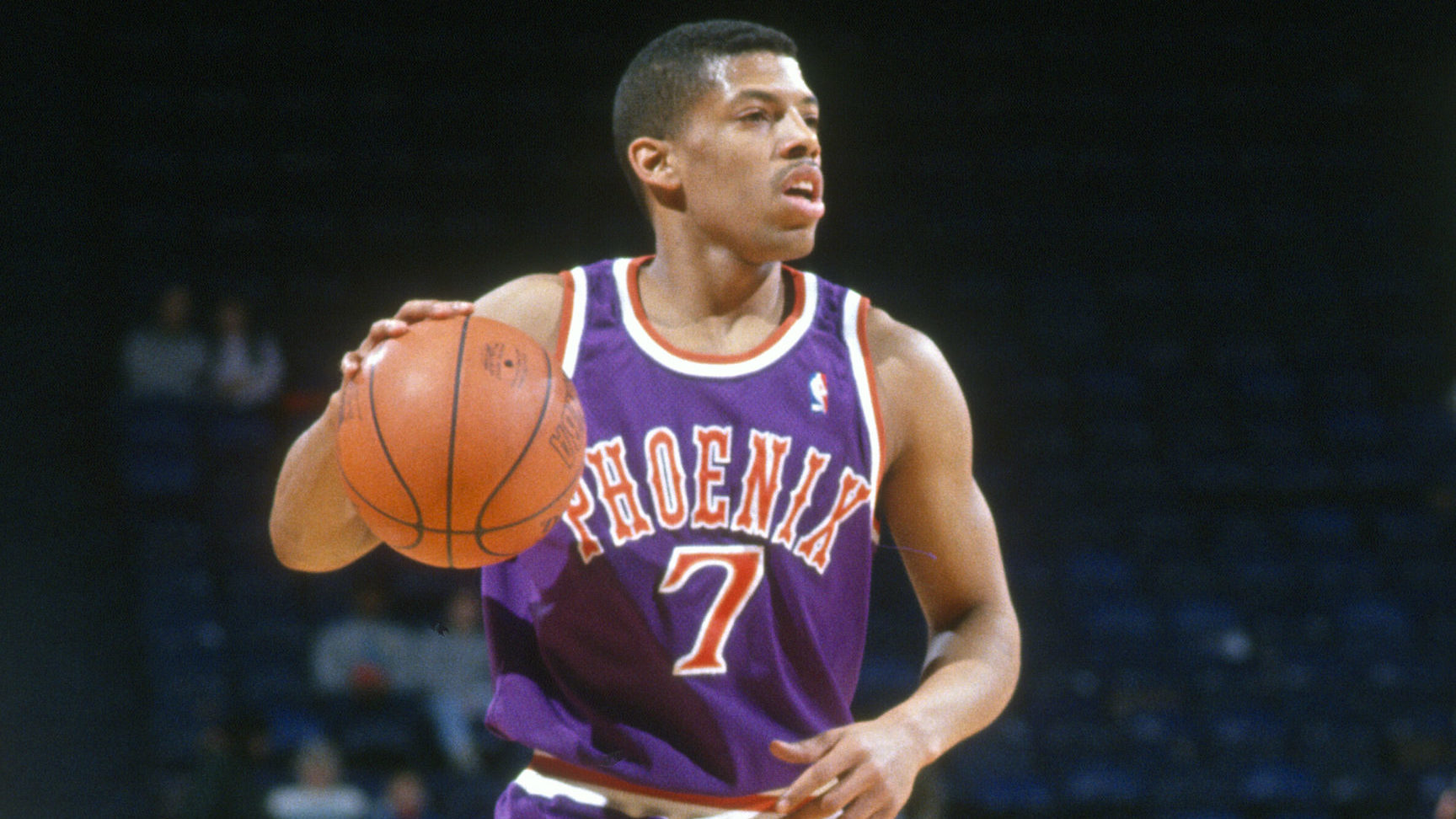 (Photo by Focus on Sport/Getty Images)
(Photo by Focus on Sport/Getty Images)
Debut date: Feb. 27, 1988
Trade details: Johnson, a rookie point guard from Cal, was playing behind Mark Price with the Cleveland Cavaliers and the Suns were going nowhere. Colangelo had purchased the team for a then-record $44 million in the wake of a drug scandal that tarnished the franchise’s name. Colangelo recognized it was time to rebuild.
The Suns sent the popular former All-Star Larry Nance, Mike Sanders and a 1988 first-round pick to the Cavs for Johnson, forward Tyrone Corbin, center Mark West, a first-round pick that turned into Dan Majerle from Central Michigan and two second-round picks.
The Debut: KJ came off the bench in relief of starter Jeff Hornacek and played 25 minutes in a 116-106 loss to the Washington Bullets at Veteran’s Memorial Coliseum. Johnson hit 2-of-5 shots, scored four points and dished out five assists.
The Suns couldn’t slow down Washington guard Jeff Malone, who scored 28 of his 47 points in the third quarter in the win.
The Aftermath: Johnson would move into the Suns’ starting lineup two games later and averaged 13.3 points and 9.1 assists for a team that floundered to an 11-15 finish in 1988. But of course, Johnson was one of the catalysts of the Suns’ turnaround in the 1988-89 season, when they added free agent Tom Chambers and rookie swingman Majerle to the mix. They won 55 games that season and advanced to the Western Conference Finals. It was the first of 13 straight seasons of making the postseason, a run which included the magical 1992-93 season and a trip to the NBA Finals.
Johnson is in the franchise’s top three in career scoring and assists, and is simply one of the best players ever to wear the purple and orange. The 1988 trade with him as a centerpiece is one of the most influential trades in Suns’ history.
Xavier McDaniel
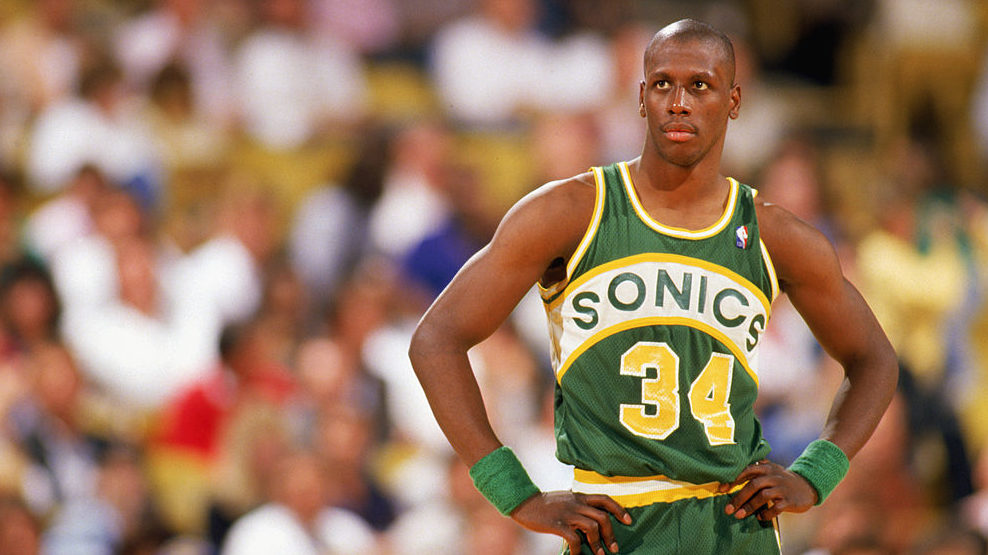 (Photo by Rick Stewart/Getty Images)
(Photo by Rick Stewart/Getty Images)
Debut date: Dec. 8, 1990
Trade details: As was not out of the ordinary in Suns’ history (see the Truck Robinson trade), Phoenix was looking to get more physical, so the team looked to the Pacific Northwest and McDaniel.
“We feel we need this type of player,” then-coach Fitzsimmons said of McDaniel at the time of the trade. “He’s tough, physical and an outstanding offensive rebounder, which is an area we need help with.”
McDaniel had also turned into a top-flight scorer, topping out at 25.5 points per game for Seattle in the 1988-89 season.
The Suns parted with an excellent sixth man, Eddie Johnson, who had won the award for that role in the 1988-89 season but had also seen a sharp decrease in playing time early in 1990-91. Phoenix also threw in first-round draft picks in 1991 and 1994.
The Debut: McDaniel came off the bench and played 33 minutes in a 113-109 road win over the Orlando Magic. He scored 17 points on 8-of-15 shooting and grabbed nine rebounds, including two of the Suns’ 14 on the offensive glass.
The Aftermath: Due to it being a rare December NBA trade, the Suns had McDaniel for 66 games in the 1990-91 season and he played in all of them, starting 64. Phoenix went 45-21 with the X-Man on the floor and finished the season 55-27, good for the third-best record in the West. They drew a tough first-round opponent in 54-win Utah and McDaniel and the Suns couldn’t handle Karl Malone. The Mailman averaged nearly 30 points and 12 rebounds per game and the Jazz breezed past the Suns three games to one. McDaniel averaged just 9.3 points and a woeful 3.8 boards in the series.
Phoenix traded McDaniel in October 1991 to the New York Knicks for forward Jerrod Mustaf. Let’s just say the trade for McDaniel nor the one to get him out of town worked very well for the Suns.
Jason Kidd
 (Photo by Brian Bahr/Allsport/Getty Images)
(Photo by Brian Bahr/Allsport/Getty Images)
Debut date: Dec. 28, 1996
Trade Details: Kidd, the 1994-95 co-Rookie of the Year (shared with Grant Hill) in his third year with the Dallas Mavericks had been feuding with teammates and grown weary of the offensive system put in place by head coach Jim Cleamons, so he became available. Suns GM Bryan Colangelo pounced, sending forwards A.C. Green and Michael Finley along with guard Sam Cassell to Dallas in exchange for Kidd, big man Loren Meyer and wing Tony Dumas.
Kidd joined a roster that already included the aforementioned Johnson and a young Steve Nash.
The Debut: A night after the trade, Kidd joined his new teammates in the Suns’ starting lineup, logging over 19 minutes of playing time in a 103-98 road win against the Vancouver Grizzlies. Kidd had six points, nine rebounds, seven assists and three steals. But he didn’t play in the second half of the game after aggravating neck and shoulder injuries in the final seconds of the first half.
The injury would keep Kidd out of the lineup for six weeks — he wouldn’t be back with the team until mid-February.
The Aftermath: After Kidd came back from the injury, the Suns went 22-10 down the stretch with the point guard averaging 11.8 points, 4.8 rebounds, nine assists and 2.4 steals per game. They finished 40-42 and made the playoffs despite starting the season a woeful 0-13 and undergoing a coaching change from Fitzsimmons to Danny Ainge after just eight games. They were knocked out of the postseason in the first round, 3-2, in a memorable series against the Seattle SuperSonics (remember Rex Chapman’s prayer three-pointer in Game 4?)
Kidd would play the next four seasons in Phoenix — he was an All-Star three times, an All-NBA First Team selection three times and an All-NBA Defensive First Team member twice. Phoenix made the postseason five straight times with Kidd on the roster but never advanced past the second round.
Due to the circumstances of his exit from town (he was traded to New Jersey in the summer of 2001 for Stephon Marbury after a domestic abuse charge stemming from an incident with his then-wife), he’s become the best and most decorated player in Suns history that nobody acknowledges. Of course, his success and longevity coupled with winning a championship in his return to Dallas has something to do with that as well.
Shaquille O’Neal
Debut date: Feb. 20, 2008
Trade Details: The Suns found themselves in first place in the Western Conference at the time, sporting a 34-14 record on Feb. 6, the date the acquisition was finalized. Phoenix sent disgruntled forward Shawn Marion and guard Marcus Banks to the Miami Heat to nab O’Neal, a 14-time All-Star, but an injury-plagued (at that point of his career) center who was about to turn 36.
After passing a physical in the afternoon, O’Neal made an appearance at U.S. Airways Center later that night and famously pointed to his ring finger as to say, “this will have jewelry on it soon”. The Suns lost to the New Orleans Hornets that night in double overtime.
“He is not going to come to Phoenix and lay an egg,” Suns head coach Mike D’Antoni said. “He is focused and ready to roll. He wants to show the pundits that this was a great trade.”
The Debut: O’Neal had been out with a hip injury, so his debut was delayed two weeks, and wouldn’t you know it, it would come against one of his former teams — the Los Angeles Lakers, where he teamed with Kobe Bryant to win three titles in the early 2000s.
O’Neal started and played 28 minutes and 45 seconds, scoring 15 points on 6-of-9 shooting to go along with nine rebounds and two blocked shots. But it was his former teammate, Bryant, who had the last laugh, scoring 41 points in leading the Lakers to a 130-124 win.
The Aftermath: The Suns went 18-11 after O’Neal’s arrival, finishing 55-27 and in sixth place in a crowded Western Conference pecking order. They quietly exited the first round of the playoffs in five games at the hands of the San Antonio Spurs — a team that Phoenix was trying harder to match up with by acquiring O’Neal. Shaq averaged just 15 points and nine rebounds per game in that series while shooting only 50 percent from the floor and an atrocious 40 percent from the free-throw line.
O’Neal would earn an All-Star nod the next season, but the Suns missed the playoffs with a 46-36 mark. In June 2009, the Suns traded O’Neal in a salary dump to the Cleveland Cavaliers for Sasha Pavlovic, Ben Wallace and a draft pick that turned into Dwayne Collins. In other words, three players who never played a minute in Phoenix uniforms.
All in all, the trade turned out to be a massive bummer, although the Suns did get to the Western Conference Finals in 2010 after jettisoning O’Neal.

